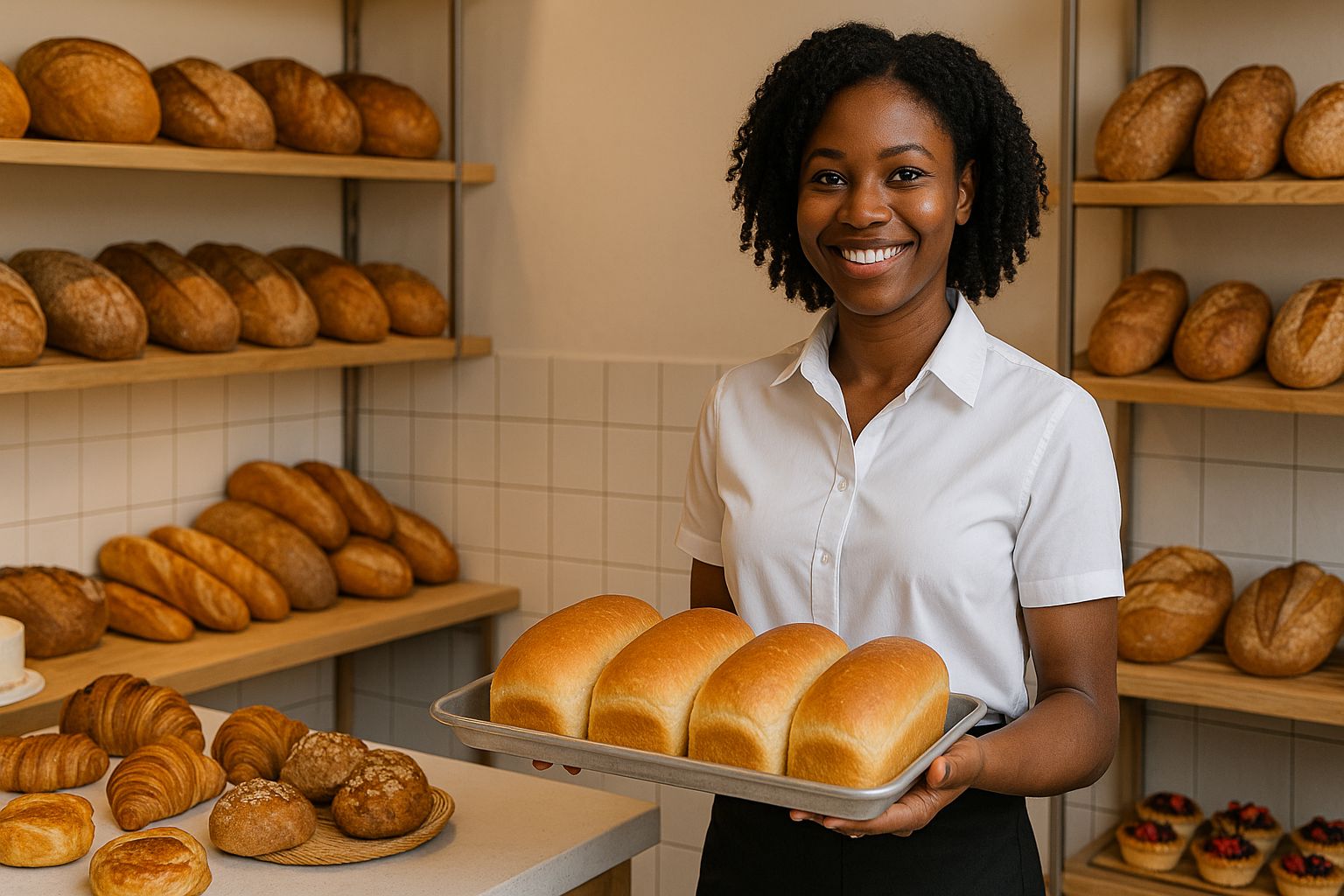
Starting a Smart Bakery Business in Nigeria 2026
Bread is Nigeria's breakfast staple. Cakes celebrate every milestone. Pastries fuel millions of snack breaks daily. The bakery industry never sleeps—and never stops growing. With Nigeria's population exceeding 220 million in 2026, bakery business represents one of the most recession-proof, scalable ventures available to Nigerian entrepreneurs.
This comprehensive guide reveals everything needed to start and scale a profitable bakery business—from small home-based operations (₦200K capital) to commercial ventures generating ₦2,000,000+ monthly.
Why Bakery Business Thrives in 2026
Staple Food Status: Bread is essential, not luxury. Demand remains constant regardless of economy.
Multiple Revenue Streams: Bread, cakes, pastries, snacks, meat pies, doughnuts, cookies—endless product possibilities.
Event Industry: Nigeria celebrates big. Every wedding, birthday, naming ceremony, corporate event needs cakes and snacks.
Daily Consumption: Unlike seasonal products, bakery goods sell daily, creating consistent cash flow.
High Profit Margins: 40-60% margins on most products when managed well.
Scalability: Start home-based, grow to commercial production.
Low Entry Barriers: Basic baking skills, modest capital, and determination suffice to start.
Bakery Business Models: Choose Your Path
1. Home-Based Bakery (₦200K Startup)
- Small scale bread and cake production
- Serve neighborhood and local market
- Minimal overhead costs
- Good for testing market
2. Specialized Cake Business (₦250K Startup)
- Focus exclusively on celebration cakes
- Birthdays, weddings, corporate events
- Higher profit margins
- Requires artistic skills
3. Snack-Focused Bakery (₦300K Startup)
- Meat pies, doughnuts, chin chin, cookies
- Supply schools, offices, supermarkets
- High volume, quick turnover
4. Commercial Bread Bakery (₦500K-₦2M Startup)
- Large-scale bread production
- Distribution network to shops and markets
- Requires proper equipment and space
- Highest profit potential
5. Full-Service Bakery (₦800K+ Startup)
- Combines all products
- Retail outlet with production facility
- Diversified revenue streams
- Requires significant investment and expertise
This guide focuses primarily on Models 1-3, accessible to most aspiring entrepreneurs.
Startup Capital Breakdown
Home-Based Bakery (₦200,000 Budget):
Equipment (₦100,000):
- Baking oven (small, gas-powered): ₦45,000-₦60,000
- Mixing bowls (various sizes): ₦5,000-₦8,000
- Baking pans (bread, cake, pastry): ₦15,000-₦20,000
- Measuring cups and spoons: ₦3,000-₦5,000
- Hand mixer: ₦8,000-₦12,000
- Rolling pin, spatulas, whisks: ₦5,000-₦8,000
- Cooling racks: ₦3,000-₦5,000
- Packaging materials: ₦10,000-₦15,000
Ingredients (Initial Stock - ₦60,000):
- Flour (50kg): ₦25,000-₦30,000
- Sugar (25kg): ₦12,000-₦15,000
- Yeast: ₦3,000-₦5,000
- Butter/margarine: ₦8,000-₦10,000
- Eggs (5 crates): ₦8,000-₦10,000
- Milk, flavor, baking powder, etc.: ₦8,000-₦12,000
Business Registration and Marketing (₦25,000):
- CAC business name: ₦15,000
- Flyers and samples: ₦10,000
Contingency (₦15,000):
- Emergency purchases
- Unexpected expenses
Medium-Scale Bakery (₦500,000 Budget):
Add to above:
- Industrial mixer: ₦80,000-₦150,000
- Larger capacity oven: ₦120,000-₦200,000
- Dough divider: ₦40,000-₦60,000
- Proofing cabinet: ₦60,000-₦100,000
- Shop rent (first month): ₦50,000-₦100,000
- Additional inventory: ₦100,000
Essential Skills and Training
Don't skip proper training. Raw talent isn't enough. Learn:
Bread Making:
- Proper kneading techniques
- Dough rising/proofing times
- Oven temperature control
- Various bread types (family loaf, baguette, rolls)
Cake Baking:
- Mixing methods (creaming, folding)
- Icing and decoration
- Flavor combinations
- Fondant work (for specialized cakes)
Pastries:
- Meat pie production
- Doughnut making
- Cookies and biscuits
- Chin chin and other snacks
Business Operations:
- Ingredient costing
- Pricing formulas
- Inventory management
- Food safety standards
Training Options:
- Apprentice with established bakery (6-12 weeks)
- Professional baking schools (₦50,000-₦200,000 courses)
- Online courses (Udemy, Coursera supplemental)
- YouTube (free but requires self-discipline)
Recommendation: Combine apprenticeship with online learning for comprehensive training.
Product Selection Strategy
Don't try baking everything initially. Focus creates excellence.
Starter Product Combinations:
Option 1: Bread + Meat Pies
- Complementary products
- Both have daily demand
- Shared equipment and ingredients
- Morning bread, afternoon pies
Option 2: Cakes + Small Chops
- Event-focused business
- High-margin products
- Weekend-heavy demand
- Allows weekday production prep
Option 3: Snacks Variety Pack
- Chin chin, cookies, doughnuts
- Longer shelf life
- School and office markets
- Consistent demand
Start with 2-3 products, master them completely, then expand range.
Step-by-Step Setup Process
Step 1: Location Decision
Home-Based Requirements:
- Dedicated kitchen/production space
- Reliable power supply
- Adequate ventilation
- Water availability
- Storage space for ingredients and finished products
Commercial Space Requirements:
- Minimum 30-40 square meters
- Production area separate from sales/display
- Good road access for deliveries
- Residential or commercial areas (not industrial)
- Reliable utilities
Zoning Compliance: Ensure location permits food production business.
Step 2: Equipment Purchase
Oven Selection (Critical Decision):
Small Gas Oven (₦45,000-₦80,000):
- 2-4 trays capacity
- Good for home-based startup
- Lower fuel costs
- Portable
Medium Gas Oven (₦120,000-₦200,000):
- 6-10 trays capacity
- Commercial production capability
- Faster baking
- More consistent heat
Industrial Electric Oven (₦300,000-₦800,000):
- 12-20 trays capacity
- Precise temperature control
- Expensive but efficient long-term
- Requires stable power or generator
Start with gas oven, upgrade to electric as business scales and power situation permits.
Other Essential Equipment:
Mixer Options:
- Hand mixer (₦8,000-₦15,000): Small batches
- Stand mixer (₦40,000-₦80,000): Medium batches
- Industrial mixer (₦100,000-₦300,000): Large-scale production
Baking Pans: Invest in quality. Cheap pans warp, affecting product quality. Budget ₦15,000-₦30,000 for initial set.
Step 3: Supplier Relationships
Find reliable suppliers for:
Flour: Buy wholesale (50kg bags) from mills or distributors. Prices: ₦23,000-₦30,000 per 50kg depending on brand and location.
Sugar: Wholesale markets offer better rates than retail shops.
Eggs: Directly from poultry farms saves 20-30%. Establish relationship with 2-3 farms for consistent supply.
Other Ingredients: Baking supplies stores, wholesale markets.
Payment Terms: Negotiate favorable terms once relationship established. Initial purchases likely cash-only.
Quality Assurance: Test suppliers. Ingredient quality directly affects product quality.
Step 4: Business Registration
CAC Registration: Business name (₦15,000) or limited company (₦50,000+)
NAFDAC Registration (For Large-Scale):
- Required if selling through supermarkets
- Costs ₦150,000-₦500,000
- Processing: 3-6 months
- Not mandatory for small home-based initially
Local Health Permits:
- Environmental health certificate
- Food handler's permit
- ₦5,000-₦15,000
Fire Service Inspection (Commercial Spaces):
- Safety compliance
- Fire extinguisher requirements
- ₦5,000-₦10,000
Pricing Strategy and Profit Margins
Costing Formula:
Total Production Cost + Desired Profit Margin = Selling Price
Sample Product Costing:
Bread (Family-Sized Loaf):
- Flour: ₦120
- Yeast: ₦20
- Sugar: ₦15
- Salt: ₦5
- Improver: ₦10
- Water/Utilities: ₦10
- Packaging: ₦15
- Total Cost: ₦195
Selling Price: ₦300-₦400 (depending on market)
Profit: ₦105-₦205 per loaf (54-105% margin)
Meat Pie (Standard Size):
- Flour: ₦50
- Margarine: ₦40
- Filling (meat, vegetables): ₦80
- Seasoning: ₦15
- Fuel/utilities: ₦10
- Packaging: ₦5
- Total Cost: ₦200
Selling Price: ₦300-₦500
Profit: ₦100-₦300 per piece
Birthday Cake (6-inch round):
- Flour: ₦150
- Sugar: ₦120
- Eggs: ₦100
- Butter: ₦200
- Flavor/baking powder: ₦50
- Icing sugar: ₦150
- Food color/decoration: ₦100
- Total Cost: ₦870
Selling Price: ₦3,000-₦5,000
Profit: ₦2,130-₦4,130 (245-475% margin)
Key Pricing Principles:
- Research local market rates
- Price competitively but not cheapest
- Factor all costs (fuel, packaging, delivery, etc.)
- Higher quality justifies premium pricing
- Adjust prices as ingredient costs fluctuate
Daily Operations and Production Schedule
Typical Production Day (Bread Focus):
11:00 PM-1:00 AM: Mix and knead dough
1:00-4:00 AM: First proofing
4:00-5:00 AM: Divide, shape, pan dough
5:00-6:00 AM: Second proofing
6:00-8:00 AM: Baking cycles
8:00-9:00 AM: Cooling and packaging
9:00 AM-12:00 PM: Distribution/sales
12:00-3:00 PM: Afternoon production (pies, snacks)
3:00-5:00 PM: Distribution and marketing
5:00-7:00 PM: Cleanup and prep for evening production
Note: Bread requires overnight production for fresh morning sales. Plan lifestyle accordingly.
Cake Production Schedule:
- Accept orders minimum 48 hours in advance
- Bake evening before delivery
- Decorate day of delivery
- Deliver/pickup in afternoon
Marketing and Customer Acquisition
Launch Strategy (First Month):
Week 1:
- Product sampling (give away 50-100 pieces)
- Target neighbors, local shops, offices
- Gather initial feedback
Week 2:
- Distribute 500-1,000 flyers in target area
- 20% launch discount
- Social media announcements
Week 3-4:
- Supply local shops on consignment
- Establish delivery routes
- Build customer database
Digital Marketing:
WhatsApp Business:
- Daily product photos
- Pre-orders through status
- Customer communication
- Payment coordination
Instagram/Facebook:
- Product showcases
- Behind-the-scenes content
- Customer testimonials
- Special offers and new products
Google My Business:
- Local search visibility
- Customer reviews
- Business hours and location
Distribution Channels:
1. Direct Sales (Highest Margin):
- Home/shop counter
- Pre-orders from individuals
- Office deliveries
2. Retail Outlets (Medium Margin):
- Neighborhood shops
- Supermarkets (requires NAFDAC for chains)
- School tuck shops
- Fueling stations
3. Bulk Orders (Lower Margin, High Volume):
- Corporate events
- Weddings and parties
- Schools (term supplies)
- Hotels and restaurants
Building Loyal Customers:
- Consistent quality every batch
- Reliable delivery times
- Excellent packaging
- Competitive pricing
- Personal touch (remembering preferences)
Profit Calculations
Small Home-Based Operation (Daily Production):
Products:
- 30 bread loaves @ ₦150 profit = ₦4,500
- 50 meat pies @ ₦150 profit = ₦7,500
- Daily Profit: ₦12,000
Monthly Profit (26 production days): ₦12,000 × 26 = ₦312,000
Less Monthly Expenses:
- Fuel: ₦20,000
- Transportation: ₦15,000
- Miscellaneous: ₦10,000
- Total: ₦45,000
Net Monthly Profit: ₦267,000
Medium-Scale Operation (After 6-12 Months):
Products:
- 80 bread loaves daily = ₦12,000 profit
- 100 meat pies daily = ₦15,000 profit
- 2 cakes weekly @ ₦3,000 profit = ₦24,000 monthly
- Daily Profit: ₦27,000
Monthly Profit: (₦27,000 × 26) + ₦24,000 = ₦726,000
Less Expenses:
- Staff (1 assistant): ₦60,000
- Fuel: ₦50,000
- Rent: ₦40,000
- Transport: ₦30,000
- Misc: ₦20,000
- Total: ₦200,000
Net Monthly Profit: ₦526,000
Commercial Operation (Year 2+):
Scale to 200-500 bread loaves daily + other products = ₦1,500,000-₦3,000,000 monthly profit
Common Challenges and Solutions
Challenge 1: Inconsistent Product Quality
Solution: Standardize recipes, use measuring tools, control oven temperatures precisely, maintain ingredient quality.
Challenge 2: Power Outages
Solution: Gas ovens (independent of electricity), generator backup, produce during available power hours.
Challenge 3: Ingredient Price Fluctuations
Solution: Buy in bulk when prices low, adjust selling prices gradually, find alternative suppliers.
Challenge 4: Unsold Products (Waste)
Solution: Produce based on orders, sell day-old at discount, donate to avoid total loss, improve demand forecasting.
Challenge 5: Intense Competition
Solution: Differentiate through quality, unique flavors, superior packaging, reliable delivery, personal service.
Challenge 6: Scaling Production Capacity
Solution: Hire trained assistants, invest in efficient equipment, establish production systems, work in batches.
Growth and Expansion Roadmap
Phase 1 (Months 1-6): Foundation
- Master 2-3 core products
- Build initial customer base
- Establish consistent quality
- Generate first profits
Phase 2 (Months 7-12): Growth
- Expand product range
- Increase production capacity
- Hire first employee
- Establish distribution network
Phase 3 (Year 2): Scaling
- Move to commercial space (if home-based)
- Purchase industrial equipment
- NAFDAC registration for wider distribution
- 3-5 employees
Phase 4 (Year 3+): Enterprise
- Multiple production lines
- Branded packaging
- Supermarket distribution
- Wholesale to other retailers
- Consider franchising model
Critical Success Factors
- Consistent Quality: Every product, every day, same high standard.
- Fresh Products: Never sell stale items. Reputation over immediate profit.
- Time Management: Baking schedules are strict. Discipline is essential.
- Hygiene: Spotless production area, personal cleanliness, food safety.
- Financial Discipline: Track every expense, maintain cash reserves, reinvest profits.
- Customer Focus: Remember preferences, accommodate special requests, build relationships.
- Continuous Learning: New recipes, techniques, market trends—never stop improving.
Conclusion
Bakery business offers Nigerian entrepreneurs proven path to substantial income and business ownership. Whether starting home-based with ₦200,000 or launching commercial operation with ₦500,000+, the market rewards quality, consistency, and determination.
Nigerians will always need bread. They'll always celebrate with cakes. Snacks will forever be consumed. Your opportunity is positioning yourself as their reliable supplier of delicious, high-quality baked goods.
Your bakery business journey begins today. Acquire skills, secure capital, start production, and bake your way to financial freedom.

